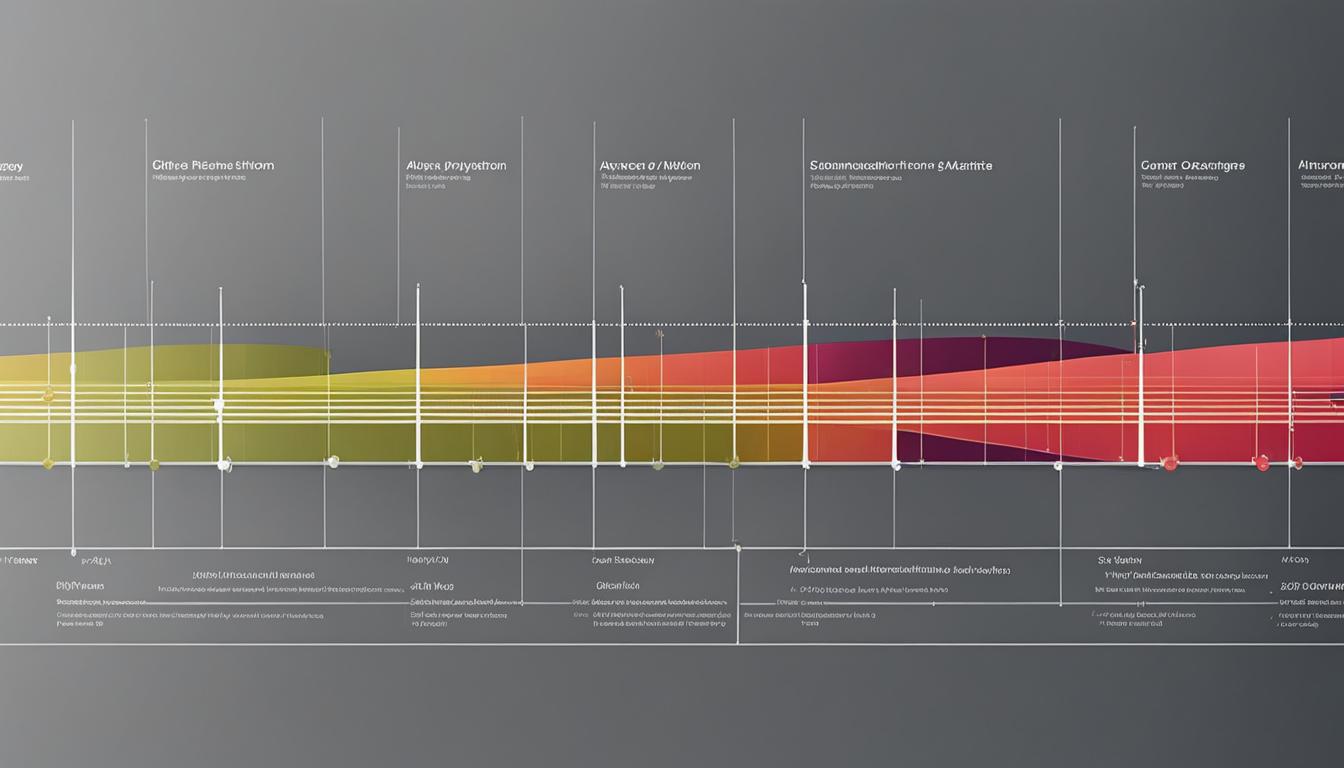Welcome to an exploration of the average relationship duration. Have you ever wondered how long the typical relationship lasts? Whether you’re single, in a new relationship, or simply curious about the statistics, this article will provide you with valuable insights.
Relationships are an integral part of our lives, and understanding their dynamics can help navigate the complexities of love and companionship. From the duration of relationships to the factors influencing their length, we’ll delve into various aspects to give you a comprehensive understanding.
So, let’s dive in and uncover the fascinating world of relationship duration, from the average length to the milestones and factors that contribute to their longevity.
Key Takeaways:
- The average relationship length is 2 years and 9 months
- 70% of relationships fail in the first year
- 36% of people meet their significant other via online dating
- The average length of a marriage is 8.2 years
- Factors such as communication skills, shared values, and trust influence relationship duration
Average Relationship Length by Age Group
When it comes to relationships, the average duration can vary depending on a person’s age group. Research shows that individuals in their 20s typically have an average relationship length of around 3 years. This is a time of exploration and self-discovery, where young adults are figuring out their own identities and what they want in a partner.
As individuals enter their 30s, the average relationship length tends to extend to around 4 years. At this stage, people have typically gained more life experience and are more likely to have a clearer understanding of what they are looking for in a long-term partner.
However, it’s important to note that the length of relationships can also be influenced by various factors. For example, younger teenagers who are dating for the first time may have shorter-term relationships as they are still navigating through the ups and downs of young love.
On the other hand, those in their 20s may face different challenges. This decade is often characterized by significant life transitions such as starting careers, pursuing higher education, or exploring different life paths. These transitions can impact the dynamics of a relationship and require adaptability and patience.
“In your 20s, you’re still figuring out who you are and what you want, so it’s natural to experience different relationships. It’s a time of growth, exploration, and learning.”
Understanding the average relationship length in different age groups can provide insights into how individuals approach and navigate relationships at different stages of their lives. It’s crucial to remember that these figures are averages and individuals’ experiences may vary.
Average Relationship Length Before Marriage
When it comes to taking the next step in a relationship, such as getting married, it’s natural to wonder how long the average couple stays together before making that commitment. The average relationship length before marriage is approximately 3.5 years, but this can vary based on several factors such as age, cultural background, and individual preferences.
Before a couple decides to tie the knot, it’s important to spend enough time together to understand each other’s values, compatibility, and long-term goals. This period allows couples to navigate through different life experiences and challenges, ultimately strengthening their bond and laying a solid foundation for a successful marriage.
In addition to the average relationship length before marriage, another important aspect to consider is the average dating time before engagement. On average, couples date for about 2 years before taking the next step and getting engaged. However, it’s interesting to note that there is some variation in this timeframe.
Less than 6 months before engagement is the choice of about 8% of couples surveyed, while 10% of couples date for 5 years or more before deciding to get married. These numbers highlight the fact that there isn’t a one-size-fits-all approach when it comes to the timing of a relationship’s progression.
Understanding the averages can provide insight into what other couples experience, but it’s important to remember that every relationship is unique. It’s essential for couples to communicate openly and honestly about their expectations and timeline for taking the next step in their relationship.
Factors Influencing Relationship Length
In order for a relationship to stand the test of time, several key factors come into play. These factors include strong communication skills, shared values, and trust.
Communication skills are vital in any relationship. The ability to express yourself openly and honestly, listen actively to your partner, and resolve conflicts effectively promotes a healthy and harmonious connection. Clear and effective communication creates a strong foundation for a lasting relationship.
Shared values serve as the glue that holds a relationship together. When you and your partner align on important aspects such as core beliefs, life goals, and priorities, it fosters a deeper connection and sense of understanding. Shared values lay the groundwork for long-term compatibility and can help navigate challenges that may arise along the way.
Trust is the cornerstone of any lasting relationship. Building and maintaining trust requires honesty, reliability, and consistency. Trust allows partners to feel secure and safe, fostering a sense of emotional intimacy and enabling them to rely on each other during difficult times.
Relationships that prioritize these factors tend to have a higher chance of lasting longer. When partners possess strong communication skills, share compatible values, and have a foundation of trust, they can effectively navigate obstacles and maintain a healthy, fulfilling connection.

Important Considerations Before Marriage
Before making the lifelong commitment of marriage, there are several important considerations that you should keep in mind. These considerations can greatly impact the success and longevity of your relationship. Let’s take a closer look at the key factors you should evaluate before saying “I do.”
Compatibility
Compatibility is a crucial aspect to consider in any relationship. It’s important to assess how well you and your partner align in terms of values, beliefs, interests, and long-term goals. While it’s not necessary to have identical personalities or shared hobbies, having a strong foundation of compatibility can help build a lasting bond.
Communication
Effective and open communication is the cornerstone of a healthy relationship. Take the time to evaluate how well you and your partner communicate with each other. Are you able to express your thoughts, feelings, and concerns openly and honestly? Do you actively listen to one another? Good communication skills can help resolve conflicts, deepen the connection, and foster mutual understanding.
Financial Compatibility
Money matters can often pose challenges in relationships, so it’s important to assess your financial compatibility. Discuss your individual financial habits, attitudes, and goals. Do you have similar views on spending, saving, and budgeting? Are you both committed to working together towards shared financial objectives? A shared understanding of financial matters can help avoid potential conflicts down the road.
Future Plans and Personal Growth
Before getting married, it’s crucial to align your future plans and aspirations. Discuss your individual goals, dreams, and expectations for the future. Are you both on the same page when it comes to important life decisions such as career ambitions, starting a family, or living arrangements? Additionally, supporting each other’s personal growth and allowing room for individual development is essential for a healthy, fulfilled relationship.
“Before getting married, it’s essential to consider compatibility, communication, financial compatibility, future plans, and personal growth.”
By carefully evaluating these important considerations before marriage, you can lay a strong foundation for a successful and enduring partnership. Open and honest communication, shared values and goals, and financial compatibility are all key factors that can contribute to a happy and fulfilling lifelong journey together.
Average Relationship Length and Marriage Statistics
When it comes to relationships and marriage, there are some interesting statistics to consider. Did you know that less than 2% of people marry their first love? It’s true! Most individuals have had a couple of serious, long-term relationships before taking that trip down the aisle.
The average length of a marriage is around 8.2 years, which is an important factor to keep in mind when considering a lifelong commitment. It’s essential to understand that relationships take time to develop and grow.
But what about saying those three little words, “I love you”? On average, couples express their love for each other at around the 5-month mark. This milestone signifies an important step in the relationship, showing that emotions are deepening and becoming stronger.
These statistics provide insight into the average duration of relationships and marriages. It’s important to remember that every relationship is unique, and these numbers are just averages. Your journey may follow a different timeline, and that’s perfectly okay.
Remember, what’s most important is the quality of the relationship and the connection shared between you and your partner. It’s the experiences, growth, and love that truly matter, no matter how long your relationship lasts.
Relationship Length by Stage and Milestones
Understanding the relationship length by stage and the importance of relationship milestones can provide valuable insights into the dynamics of a partnership. Most relationships tend to reach a critical point after the two-year mark, where the early stages of a relationship heavily influence the oxytocin and dopamine levels.
Various stages and milestones play a significant role in determining the average relationship duration. One notable milestone is the first year, which often presents a challenge for couples. In fact, statistics indicate that the first year of a relationship has a 70% failure rate, highlighting the complexities of navigating this initial stage. However, as couples surpass this milestone and progress into subsequent years, there is a decline in relationship failures.
“The first year of a relationship is a pivotal time. It’s a period of adjustment and testing the waters. Successfully navigating this stage signifies a strong foundation for the future.” – Relationship Expert
As the relationship continues to mature, additional milestones and stages emerge, each impacting the overall relationship duration. These may include moving in together, experiencing major life events together, and reaching a point of mutual commitment, such as discussing long-term plans or considering marriage.
While each couple’s journey is unique, recognizing the significance of these relationship milestones can help foster a deeper understanding of the dynamics at play and potentially contribute to a more fulfilling and lasting partnership.

Navigating the Early Stages
The early stages of a relationship are a crucial time where couples are still getting to know each other, building trust, and establishing a strong connection. During this phase, communication, patience, and understanding are key. It’s important to remember that each individual brings their own experiences, values, and expectations to the table, which can impact the pace and development of the relationship.
By investing time and effort in building a solid foundation during the early stages, couples can enhance their chances of successfully progressing through the relationship milestones and achieving a meaningful and enduring partnership.
Conclusion
In conclusion, the average duration of a relationship is approximately 2 years and 9 months. However, it is important to note that this can vary depending on factors such as age, individual preferences, and various other circumstances.
Strong communication, trust, and shared values are key factors that contribute to the longevity of relationships. Building a solid foundation based on open and honest communication, mutual trust, and shared beliefs can significantly increase the chances of a long-lasting relationship.
Prior to making a lifelong commitment in marriage, it is crucial to consider important aspects such as compatibility and effective communication. Understanding each other’s needs, goals, and aspirations, as well as having financial compatibility and a shared vision for the future, can greatly enhance the chances of a successful and fulfilling marriage.
FAQ
How long does the average relationship last?
The average relationship length is approximately 2 years and 9 months.
What is the average relationship length by age group?
In the 20s, the average relationship length is 3 years, while in the 30s, it extends to 4 years.
What is the average relationship length before marriage?
The average relationship length before marriage is 3.5 years.
What factors influence the length of a relationship?
Strong communication skills, shared values, and trust are factors that contribute to longer-lasting relationships.
What are some important considerations before marriage?
Before getting married, it is essential to consider factors such as compatibility, communication, financial compatibility, future plans, and personal growth.
What are the statistics on average relationship length and marriage duration?
The average length of a marriage is 8.2 years.
How does the relationship length vary by stage and milestones?
Most relationships end after the two-year mark, and the first year has a 70% failure rate. Relationship duration depends on various stages and milestones.
What can we conclude about average relationship duration?
The duration of an average relationship is approximately 2 years and 9 months, but it can vary based on age, individual preferences, and other factors.
Source Links
- https://www.thehivelaw.com/blog/how-long-does-the-average-relationship-last/
- https://www.marriage.com/advice/relationship/average-length-of-a-relationship/
- https://www.ncbi.nlm.nih.gov/pmc/articles/PMC9820285/


